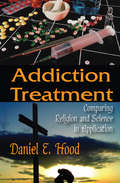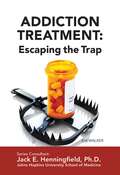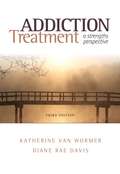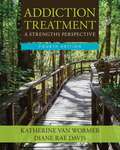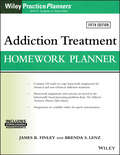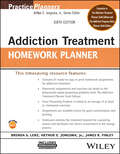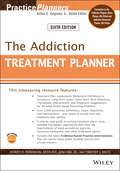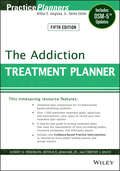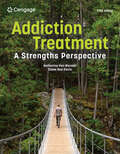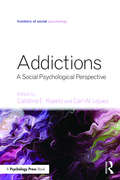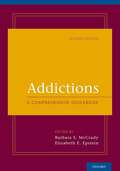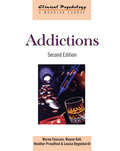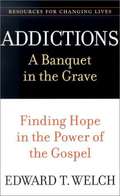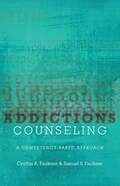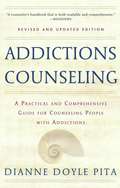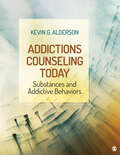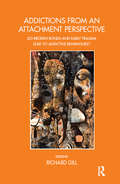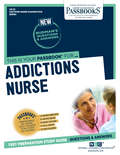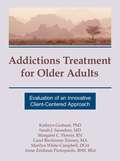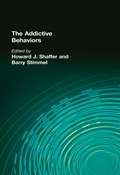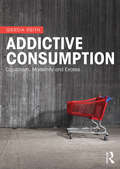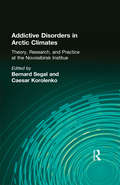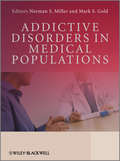- Table View
- List View
Addiction Treatment: Comparing Religion and Science in Application
by Daniel E. HoodAddiction Treatment is an ethnography that compares two types of residential drug-free treatment programs-religious, faith-based programs and science-based, secular programs. Although these programs have originated from significantly different ideological bases, in examining the day-to-day operations of each, Daniel E. Hood concludes that they are far more alike than they are different. Drug-free treatment today, whether in secular or religious form, is little more than a remnant of the temperance movement. It is a warning to stop using drugs. At its best, treatment provides practical advice and support for complete abstinence. At its worst, it demeans users for a form of behavior that is not well understood and threatens death if they do not stop. Hood argues that there is no universal agreement on what addiction is and that drug abuse is little more than a catch-all term of no specific meaning used to condemn behavior that is socially unacceptable. Through extensive participatory observations, intimate life history interviews, and informal conversations with residents and staff, Hood shows how both programs use the same basic techniques of ideological persuasion (mutual witnessing), methods of social control (discourse deprivation), and the same proposed zero tolerance, abstinent lifestyle (Christian living vs. Right living) as they endeavor to transform clients from addicts to citizens or from sinners to disciples.
Addiction Treatment: Escaping the Trap (Illicit and Misused Drugs)
by Ida WalkerIn the United States and Canada, millions of individuals have problems with substance abuse. In some cases the problems are relatively minor, but in others, that abuse leads to addiction. Addiction is a serious and costly disease. In Addiction Treatment: Escaping the Trap, you will learn some definitions important in the study of addiction treatment. You will also learn about the history of addiction treatment, including the work and continuing influence of the Washingtonians, the Emmanuel Movement, the Oxford Movement, and of course, Alcoholics Anonymous. Treatment philosophies are also presented in this book Not all treatment methods are alike, and successful addiction treatment combines a variety of approaches. In Addiction Treatment, you will learn that recovery is an ongoing process, and read about suggestions on how to maintain a sober life.
Addiction Treatment: A Strengths Perspective (Third Edition)
by Katherine Van Wormer Diane Rae DavisThis book covers the biological, psychological, and social aspects of alcoholism, eating disorders, compulsive gambling, and other addictions.
Addiction Treatment: A Strengths Perspective (Fourth Edition)
by Katherine Van Wormer Diane Rae DavisADDICTION TREATMENT covers the biological, psychological, and social aspects of alcoholism, eating disorders, compulsive gambling, and other addictions. The authors bridge the gap between the popular twelve-step and harm-reduction approaches, thus illuminating how you, as a future practitioner, can guide your clients down a trusted path that is tailored towards the client's particular needs. Through a number of first-person narratives about the experience of addiction, you will discover a realism and depth not commonly found in textbooks. Interesting and relevant topics -- such as the case against so-called underage drinking laws and an inside story of working in a casino -- draw you into the material and illustrate the importance of reducing harm within the biopsychological framework that ties the text together.
Addiction Treatment Homework Planner (PracticePlanners #209)
by Arthur E. Jongsma Jr.Help clients suffering from chemical and nonchemical addictions develop the skills they need to work through problems. The Addiction Treatment Homework Planner, Fifth Edition provides you with an array of ready-to-use, between-session assignments designed to fit virtually every therapeutic mode. This easy-to-use sourcebook features: 100 ready-to-copy exercises covering the most common issues encountered by clients suffering from chemical and nonchemical addictions, such as anxiety, impulsivity, childhood trauma, dependent traits, and occupational problems A quick-reference format—the interactive assignments are grouped by behavioral problems including alcoholism, nicotine dependence, and sleep disturbance as well as those problems that do not involve psychoactive substances, such as problem gambling, eating disorders, and sexual addictions Expert guidance on how and when to make the most efficient use of the exercises Assignments that are cross-referenced toThe Addiction Treatment Planner, Fifth Edition so you can quickly identify the right exercise for a given situation or problem All exercises are available online for you to download and customize to suit you and your clients' unique styles and needs
Addiction Treatment Homework Planner (PracticePlanners #209)
by Brenda S. Lenz Arthur E. Jongsma Jr. James R. FinleyA hands-on homework toolkit for mental health practitioners treating clients with substance use disorders In the newly revised sixth edition of the Addiction Treatment Homework Planner, a team of distinguished clinicians delivers a practical and effective resource for clients who wish to keep their therapy and recovery efforts front-of-mind and incorporate them into their daily lives. The activities and homework contained within will assist clients—and the clinicians treating them—to collect real-time data, enabling practitioners to address relevant issues quickly and collaboratively. This Homework Planner is designed as a companion manual to the sixth editions of the Addiction Treatment Planner and Addiction Progress Notes Planner. It focuses on client-centered, assessment-driven, evidence-based treatment in the field of substance use disorder psychotherapy. Each included exercise is designed to: Emphasize the importance of client motivation and increase the knowledge, awareness, and insight of people moving through the addiction recovery process Incorporate a skills component for further instruction in therapy or at home Be completed or processed within individual sessions or – where appropriate – within group therapy sessions and at various levels of careAn indispensable, hands-on resource for counselors, therapists, psychiatrists, psychologists, and other mental health professionals engaged in the treatment of patients with substance use disorders, the Addiction Treatment Homework Planner is a time-saving tool with the potential to improve patient outcomes and increase client engagement.
The Addiction Treatment Planner: Includes Dsm-5 Updates (PracticePlanners #192)
by Arthur E. Jongsma Jr.Clarify, simplify, and accelerate the treatment planning process so you can spend more time with clientsThe Addiction Treatment Planner, Sixth Edition: provides all the elements necessary to quickly and easily develop formal treatment plans that satisfy the demands of HMOs, managed care companies, third-party payers, and state and federal agencies. This valuable resource contains treatment plan components for 48 behaviorally based presenting problems including depression, intimate relationship conflicts, chronic pain, anxiety, substance use, borderline personality, and more. You'll save hours by speeding up the completion of time-consuming paperwork, without sacrificing your freedom to develop customized treatment plans for clients. This updated edition includes new and revised evidence-based objectives and interventions, new online resources, expanded references, an expanded list of client workbooks and self-help titles, and the latest information on assessment instruments. In addition, you'll find new chapters on some of today's most challenging issues- Opiod Use Disorder, Panic/Agoraphobia, Loneliness, and Vocational Stress. New suggested homework exercises will help you encourage your clients to bridge their therapeutic work to home. Quickly and easily develop treatment plans that satisfy third-party requirements. Access extensive references for treatment techniques, client workbooks and more. Offer effective and evidence-based homework exercises to clients with any of 48 behaviorally based presenting problems. Enjoy time-saving treatment goals, objectives and interventions- pluse space to record your own customized treatment plan. This book's easy-to-use reference format helps locate treatment plan components by presenting behavioral problem or DSM-5 diagnosis. Inside, you'll also find a sample treatment plan that conforms to the requirements of most third-party payors and accrediting agencies including CARF, The Joint Commission (TJC), COA, and the NCQA. The Additction Treatment Planner, Sixth Edition: will liberate you to focus on what's really important in your clinical work.
The Addiction Treatment Planner
by Robert R. Perkinson Arthur E. Jongsma Jr. Timothy J. BruceThe bestselling treatment planning system for mental health professionalsThe Addiction Treatment Planner, Fifth Edition provides all the elements necessary to quickly and easily develop formal treatment plans that satisfy the demands of HMOs, managed care companies, third-party payors, and state and federal agencies.New edition features empirically supported, evidence-based treatment interventionsOrganized around 43 behaviorally based presenting problems, including substance use, eating disorders, schizoid traits, and othersOver 1,000 prewritten treatment goals, objectives, and interventions--plus space to record your own treatment plan optionsEasy-to-use reference format helps locate treatment plan components by behavioral problemIncludes a sample treatment plan that conforms to the requirements of most third-party payors and accrediting agencies including CARF, The Joint Commission (TJC), COA, and the NCQA
Addiction Treatment: A Strengths Perspective
by Katherine Van Wormer Diane Rae DavisVan Wormer/Davis' ADDICTION TREATMENT: A STRENGTHS PERSPECTIVE, 5th Edition, covers biological, psychological and social aspects of alcohol and eating disorders, gambling and other addictions. 12-step and harm-reduction approaches are connected to show how clients are guided down paths tailored to their needs. Stress is a major theme in the development of substance use disorders and a parallel national crisis like the opioid/fentanyl death toll has shifted from a criminal justice response toward a public health approach to addiction. First-person narratives about addiction expose students to a realism not commonly found in textbooks. Updated with the DSM-5-TR of 2022 and use of person-first language, the latest insights into social determinants of health, trauma-informed care, transgender populations and other topics are included.
Addictions: A Social Psychological Perspective (Frontiers of Social Psychology)
by Catalina E. Kopetz Carl W. LejuezThe current volume brings together social psychological theories and concepts and discusses their relevance to understanding substance use and addiction. It identifies convergence points between traditional perspectives on addiction and social psychological theory and research. This coexistence, which acknowledges the value of the conceptual and methodological advancements in each relevant field and attempts to integrate them, promotes scientific understanding and a more effective prevention and treatment of addiction.
Addictions: A Comprehensive Guidebook
by Barbara S. McCrady Elizabeth E. EpsteinAddictions: A Comprehensive Guidebook, Second Edition, features a roster of senior scientists covering the latest findings in the study of alcohol and other drug use, abuse, and dependence. Skillfully edited by Drs. Barbara S. McCrady and Elizabeth E. Epstein, the chapters primarily review the literature published in the last 14 years since the first edition. The volume covers seven different content areas: Section I addresses broad conceptual issues as well as information on the etiology, neuroscience, epidemiology and course of alcohol and other drug use, abuse, and dependence. Section II provides detailed pharmacological and clinical information on the major drugs of abuse, including alcohol. Sections III, IV, and V focus on knowledge of importance to clinical practice, including a section on assessment and treatment planning, information on a range of empirically supported treatments, and issues related to clinical practice. Section VI provides information about specific population groups, and Section VII addresses policy, prevention, and economic issues in the field. The book is appropriate for a wide variety of readers who are either treating, learning to treat, doing research on, or teaching about addictions. Comprehensive and succinct, it is written in a manner that is accessible and useful to practitioners, students, clinician trainees, and researchers. It is also an ideal textbook for graduate courses and training programs in psychology, psychiatry, social work, and addictions certifications, and for advanced undergraduate courses on alcohol and other substance use disorders
Addictions (Clinical Psychology: A Modular Course)
by Maree Teesson Wayne Hall Heather Proudfoot Louisa DegenhardtThe first edition of Addictions established itself as a valuable resource for students and professionals alike. This authoritative new edition builds on the success of the previous book, incorporating advances in research and practice over the last ten years. The book includes material on: the nature of addiction and who becomes addicted health consequences of alcohol and other drug dependence theories and causes of addiction. The authors, experts in the field, also include new material on the controversy surrounding the possible positive effects of alcohol and cannabis use, the increased risk of interpersonal violence, and new research on theories of addiction. Addictions will be essential reading for students, professionals and researchers seeking state of the art information about this rapidly growing field.
Addictions: A Banquet in the Grave, Finding Hope in the Power of the Gospel
by Edward T. WelchThis book on addictions offers a profoundly biblical analysis of addictive behavior and helps readers face their own addictions.
Addictions Counseling: A Competency-based Approach
by Cynthia A. Faulkner Samuel FaulknerWritten by authors with extensive experience as practitioners and educators, this text serves as a straightforward resource for undergraduate and graduate students who have a goal of becoming counselors or therapists in the field of addiction. <p><p>While many books on the subject follow a similar format (i.e., introduction, classification of drugs, theories of counseling, etc.), Addictions Counseling takes one client and follows her through the entire treatment experience-from referral and assessment, all the way through relapse prevention and discharge planning. In following her through the treatment journey, readers are introduced to theories and techniques for approaching each of the topics discussed. This book is a must-read for anybody interested in pursuing a career as an addiction specialist.
Addictions Counseling: A Practical and Comprehensive Guide for Counseling People with Addictions
by Dianne Doyle PitaThis wholly revised and updated edition of Addictions Counseling is widely read by professional counselors as well as ministers, teachers, and nurses. Topics include the counselor's role in recovery, treatment approaches, and sample treatment plans.
Addictions Counseling Today: Substances and Addictive Behaviors
by Kevin G. AldersonEnlightening and practical, Addictions Counseling Today invites readers into the heart of addictive thinking, offering first-person accounts of what it is like to experience different addictions. The text covers the range of addictions from alcohol, drug abuse, and nicotine to various process addictions, including sex, internet, gaming, social media, and gambling. Also included are the various theories and models of addiction, with a unique chapter on the neuroscience of addiction. Focusing on the new DSM-V classifications for addiction with an emphasis on CACREP and treatment, this provocative, contemporary text is an essential reference for readers wanting to gain a deeper understanding of those with addiction.
Addictions Counseling Today: Substances and Addictive Behaviors
by Kevin G. AldersonEnlightening and practical, Addictions Counseling Today invites readers into the heart of addictive thinking, offering first-person accounts of what it is like to experience different addictions. The text covers the range of addictions from alcohol, drug abuse, and nicotine to various process addictions, including sex, internet, gaming, social media, and gambling. Also included are the various theories and models of addiction, with a unique chapter on the neuroscience of addiction. Focusing on the new DSM-V classifications for addiction with an emphasis on CACREP and treatment, this provocative, contemporary text is an essential reference for readers wanting to gain a deeper understanding of those with addiction.
Addictions From an Attachment Perspective: Do Broken Bonds and Early Trauma Lead to Addictive Behaviours? (The Bowlby Centre Monograph Series)
by Richard GillThis outstanding book is an important collection of papers from the 2013 John Bowlby Memorial Conference by accomplished clinicians from different modalities who share their experience of working with people with different kinds of addiction. The papers bring together an in-depth understanding that addictions are a response to, and hold the pain of, broken attachments and are best treated within healthy interpersonal relationships. For a long time the person with an addiction has been seen as the problem with society being able to live in denial of the causes. These papers open up innovative and effective ways of working with people troubled by addiction from an attachment-informed perspective. Contributors: Cara Crossan, Richard Gill, Lynn Greenwood, Bob Johnson, Liz Karter, Edward Khantzian, Arlene Vetere, Kate White, Jason Wright
Addictions Nurse: Passbooks Study Guide (Certified Nurse Examination Series)
by National Learning CorporationThe Certified Nurse Examination Series prepares individuals for licensing and certification conducted by the American Nurses Credentialing Center (ANCC), the National Certification Corporation (NCC), the National League for Nursing (NLN), and other organizations. The Addictions Nurse Passbook® provides a series of informational texts as well as hundreds of questions and answers in the areas that will likely be covered on your upcoming exam.
Addictions Treatment for Older Adults: Evaluation of an Innovative Client-Centered Approach
by Kathryn Graham Sarah J Saunders Margaret C Flower Carol B Timney Marilyn White-Campbell Anne ZeidmanHere is a detailed description of an innovative approach for treating elderly persons who have alcohol or drug problems. During the past few years there has been growing recognition of the special needs of these individuals. Addictions Treatment for Older Adults describes the evaluation of the Community Older Persons Alcohol (COPA) Program. This book helps readers understand the nature of substance abuse among the elderly, as well as how to identify and intervene with older persons who have alcohol and drug problems, including persons who are reluctant to seek treatment. Addictions Treatment for Older Adults explains the development of the COPA program and how it works. Many case studies and tables provide illuminating details for readers who work with this elderly population. Chapters examine characteristics of elderly persons with alcohol or drug problems the typology of COPA clients and their problem areas treatment interventions variables associated with improvement analysis of progress made by clients during and after treatment the factors that seem to predict recoveryThe in-depth descriptions in this book provide much needed information and guidance for professionals striving to meet the treatment and care needs of elderly substance abusers. Addictions Treatment for Older Adults should be read by researchers in the substance abuse field and by persons who work with the elderly, such as community nurses, social workers, and physicians. In this book they will find the best description to date of the nature of alcohol and drug problems among elderly who live in their communities.
The Addictive Behaviors
by Howard J Shaffer Barry StimmelThoroughly examines the natural history and social etiology of addictive behaviors.
Addictive Consumption: Capitalism, Modernity and Excess
by Gerda ReithIn this engaging new book, Gerda Reith explores key theoretical concepts in the sociology of consumption. Drawing on the ideas of Foucault, Marx and Bataille, amongst others, she investigates the ways that understandings of ‘the problems of consumption’ change over time, and asks what these changes can tell us about their wider social and political contexts. Through this, she uses ideas about both consumption and addiction to explore issues around identity and desire, excess and control and reason and disorder. She also assesses how our concept of 'normal' consumption has grown out of efforts to regulate behaviour historically considered as disruptive or deviant, and how in the contemporary world the 'dark side' of consumption has been medicalised in terms of addiction, pathology and irrationality. By drawing on case studies of drugs, food and gambling, the volume demonstrates the ways in which modern practices of consumption are rooted in historical processes and embedded in geopolitical structures of power. It not only asks how modern consumer culture came to be in the form it is today, but also questions what its various manifestations can tell us about wider issues in capitalist modernity. Addictive Consumption offers a compelling new perspective on the origins, development and problems of consumption in modern society. The volume’s interdisciplinary profile will appeal to scholars and students in sociology, psychology, history, philosophy and anthropology.
Addictive Disorders in Arctic Climates: Theory, Research, and Practice at the Novosibirsk Institute
by Bernard SegalDiscover fresh perspectives on alcoholism treatment and research with this enlightening new book describing the work of researchers at the Novosibirsk Medical Institute, USSR. By using specific examples of their studies in Siberia, the reserachers offer an innovative approach to the treatment of addictive disorders in general. Instead of focusing on the drinking behavior itself, the treatment focuses on the relation of the problem to the interaction of economic, social, and psychological factors. To address the question of whether alcoholics should all be treated in the same way, or if alcholism treatment should be more individualized in approach, chapters are devoted to the differences between alcoholism in women, adolescents, and alchoholics who are afflicted with “rapid development of alcholism syndrome.” The research examples in Addictive Disorders in Arctic Climates benefits professionals involved in the treatment of alcholism by introducing new perspectives and broadening contemporary research.
Addictive Disorders in Medical Populations
by Mark S. Gold Norman S. MillerThis book has a much wider focus than traditional books written about drug and alcohol addictions. This unique book is written by medical specialists who diagnose, treat and research addictive disorders in their specialities. Thus, it meets the needs of the typical medical practitioner who wants to learn about and treat patients with addictive disorders in their practices. Because alcohol and drug problems are so prevalent and affect medical conditions profoundly, the medical specialist will improve their knowledge and skill to diagnose and treat addictive disorders in their specialties.Drug and alcohol addictions occur commonly in medical populations; 25-50% of patients seen by primary care physicians have alcohol and drug disorders, with even higher prevalence in certain medical specialty populations. Drug use (including illicit drug use and actual or perceived misuse of prescribed medications), alcohol use, and what has been called unhealthy drinking are even more common in trauma centers and our society. Currently, there are no authoritative addiction texts that focus on the identification, intervention and management of either "addictive disorders in medical populations" or "medical complications in addiction populations".Neurobiological progress in the field of addiction has been amazing and evidence-based treatments have developed at a phenomenal pace, with bench to office applications for tobacco, alcohol and drugs. Pharmacological and psychosocial treatments are described here in detail and in practical terms. The medical and mental complications of addiction are explained comprehensively throughout the text. Clinical considerations are the predominant theme, with the standards of clinical practice grounded in the most current research. The chapters include practical presentations of both clinical and research materials, with instruments for screening and assessment and treatment.It will be useful for all those seeking information to help a patient or family with a tobacco, alcohol or drug problem. We hope this book can give answers and direction to the identification and management of addictions and their medical complications in patient populations.
Addictive Love: Volume 1 (Volume 1 #1)
by Yu Xiaoqi"Yi Nian Xue, you think you can get rid of me just by pretending you don't know me? I tell you, there's no door. "As long as my descendant is alive, you will never be able to leave my grasp." I just want you to give me a baby. Our child. " The cold and aloof CEO Greywolf closed in on the little white rabbit step by step, setting traps everywhere to lure the little white rabbit. A great battle of love had begun.
